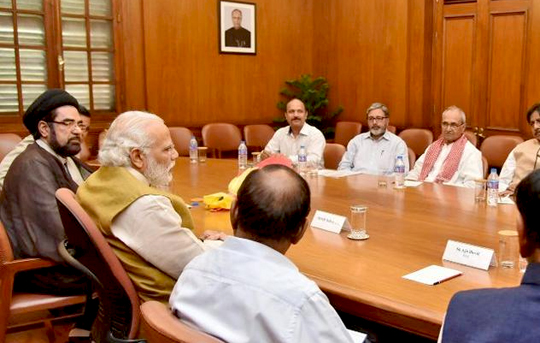New Delhi, Apr 18: A government press release, dated April 13, announcing that “eminent Muslim citizens” had met Prime Minister Narendra Modi to congratulate him on “his recent successful visit to Saudi Arabia”, has provoked strong reactions from some members of the delegation, who have disputed the public relations spin given to the interaction.
Expressing unhappiness at the manner in which the note put out by the Press Information Bureau (PIB) was worded, journalist Qurban Ali said, “We were invited to discuss the trust deficit between the Muslim community and the government, and what could be done to end this.”
Editor of Nai Duniya and former MP Shahid Siddiqui, who was also present on the occasion, also confirmed this: “I was told that we would discuss the economic and educational backwardness of Muslims … I made concrete suggestions for the community's uplift and pointed out that the benefits of many government schemes for minorities are not reaching them.”
Only a few persons, including Dr. M.J. Khan, who led the delegation, and Shia cleric Kalbe Jawad from Lucknow, expressed their appreciation of the measures taken by Mr. Modi to improve relations with the Muslim world, members of the delegation said.
The PIB note says: “They [the delegation members] said people in West Asia, Central Asia and North Africa, especially the youth, are extremely impressed with the development agenda of Shri Narendra Modi, and want good relations with India.”
West Asia expert Qamar Agha said he spoke both on the positive impact of the Prime Minister's West Asia policy as well as on the need to focus on education for Muslims and post-education skilling programmes: “I said we need to open schools in Muslim-dominated areas which children of all communities can attend.”
Rajnath initiative
Dr. Khan, who was originally general secretary of the Uttar Pradesh-based Peace Party, had joined the BJP in end-2013. Today, he says, he is not, strictly speaking, with the BJP and prefers to be described as the National Convenor of Indian Muslims Research and Coordination Centre, but remains close to Union Home Minister Rajnath Singh. Wednesday's meeting took place on the suggestion of Mr. Singh.
Boosting ties
“I led the delegation,” Dr. Khan said, “after discussions with the Home Minister. At the meeting with the Prime Minister, we spoke of strengthening relations with the Muslim world as that would improve Hindu-Muslim relations at home. We expressed our elation at his being conferred Saudi Arabia's highest civilian honour, the King Abdulaziz Sash.”
But he stressed that the delegation also used the occasion to bring to the Prime Minister's notice many concerns of the Muslim community, relating both to secular and religious matters, that are part of a seven-point formula that was earlier given to Mr. Singh.
The issues raised included the ongoing controversy over retaining the Aligarh Muslim University's minority character and the need for a review committee to look at cases of innocent Muslim youths, who have been jailed on false charges.
The Prime Minister, several delegation members said, was forthcoming on welfare issues relating to Muslims, but was silent on controversial matters such as AMU.
Seeks representation
Kalbe Jawad also urged the Prime Minister to visit Iran, a Shia nation, to “balance” his visit to Saudi Arabia. The PM said he would be going to that country soon. The Maulana also stressed that Shias should be better represented in government bodies and communities.
Kalbe Jawad's meeting with the Prime Minister comes days after the passport office in Lucknow directed him to surrender his passport as two criminal cases are pending against him. He has been accused of “rioting with deadly weapon, undermining public order, and deterring public servant from discharging duties among others.”





Comments
It is a shame to name sake muslims (munafiqs) who trust Modi and BJP who have no agenda other than cheating muslims. the so called pro bjp muslims are being paid for telling in favoer of mOdi and bjp. Shame on you hypocrites. Go to hell. May Allah punish you in this world and also in the life after death unless you repent.
Don't be surprised lying is not new for Modi, he has started from 15 Lakhs rupees for each household...did anyone get this amount....gasoline price is sky rocketing even though crude price came down to 30 USD...promised during election he will reduce it....did you see it happening....
When Muslim leaders become hypocrites, visiting a murderer PM seeking his assistance, you people deserve such disgrace. Just wait and watch, there is more humiliation for you muslim leaders if you continue to do this. #MoNa has failed to deliver Ache din to his own people, and you guyz are expecting wonders for you?
Now you Buffoons understand what is what you thought Running dog having have some madness to unite all in Hindustan that's why these dogs started running last 60 odd years!!!!! you fools not yet understand, what's inside in his and his followers heart completely wrong thinking, now Master Khan sabb understand what is it inside, any Way \Every Dog has its own Day\" maharajas do not dream Modianna and his cheals have their own agenda you feel where it stand.
Jai hoo Hindustan.
Jai hoo bharath matha."
It is good that Kalbe Jawed is asked to surrender his passport, as he is always speaking about shias and not for Muslims..... Such Moulanas should be booted /kicked out.....
Modi visited K.S.A as an representative of Ambani not as an P.M of India.
Chaiwala chai dene keliye gaya tha. Desh keliye nahin.
Lie and cheating is in their blood.
Add new comment